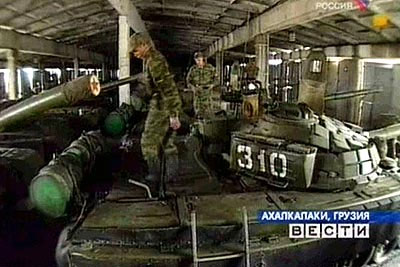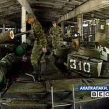
RUSSIAN AND GEORGIAN MILITARIES BICKER OVER TANK MOVEMENTS
Publication: Eurasia Daily Monitor Volume: 2 Issue: 140
By:

While the Russian military bases in Georgia are scheduled to close in 2008, their continued presence keeps the Georgian leadership on alert. Moscow appears to be using the bases to impede Tbilisi’s efforts to bring stability to the country.
On July 15, the Georgian military intercepted two T-72 tanks from the Russian military base in Batumi (Ajaria). According to the Georgian side, the tanks were heading to the Gonio training ground near Batumi to participate in military exercises. The Russian tanks were released later that same day. Symptomatically, the incident occurred on the eve of Georgian President Mikheil Saakashvili’s scheduled visit to Ajaria, where he will meet with local leaders to review preparations for the holiday season and ways to attract more tourists to the region.
The Russian military command said that Georgia’s actions ran counter to the agreement reached between the Russian and Georgian foreign ministers whereby Russia has the right to fully use the Gonio training ground until September 1, 2005 (RBK TV, July 15).
Colonel Vladimir Kuparadze, deputy commander of the Group of Russian Forces in the Trans-Caucasus, claimed that there was neither a formal nor an informal agreement between the Georgian and Russian sides prohibiting military exercises at the Gonio firing range during the holiday season. He also denied that Russia planned any military exercise in Gonio. Kuparadze said that the tanks were being moved for a maintenance inspection only, but for some reason the Georgian side considered this relocation to be “maneuvers” and detained the tanks. Kuparadze described the decision by the base command to suspend equipment transfers as a “goodwill gesture,” as if the Russians were ready to retaliate (Civil Georgia, Rosbalt, Media News, TV Rustavi-2, July 15).
The Georgian side seemed to view the issue in both a military and a political context. Georgian Defense Minister Irakli Okruashvili, known for his stubborn attitude toward Russia, said, “Everyone must get used to one fact: this is a state and they must obey the laws of this state. The holiday season is underway in Ajaria, and we will not put up with what has been happening for years when tanks have been firing 500 meters from the people relaxing on beaches,” he stressed (Caucasus Press, TV Rustavi-2, July 15). Okruashvili’s statement that this type of behavior by the Russian military is absolutely unacceptable emphasized that the days of smooth-tongued relations with Russia have passed.
The Georgian side charged that the command of the military base did not clear its plans for military exercises in Gonio with the Georgian authorities. The Georgian side also claimed that any military training in Gonio was prohibited from July 15 to September 15, when Ajaria’s beaches receive the largest inflow of tourists. The Georgian Defense Ministry claimed that it had informed the command of the Russian troops in Georgia about this in advance. Moreover, the Georgian defense officials said that, instead of Gonio, they had suggested that the Russian military conduct exercises in Simoneti (near Kutaisi — Georgia’s second largest city), which is 150 kilometers away from Batumi. The Ministry said that the Russian side had ignored its request to not conduct military exercises during the holiday season in Ajaria.
On July 16, the Georgian Defense Ministry issued a statement saying that the Russian side had violated the agreement. Yet the ministry later admitted, “According to the existing agreement, the Russian side still has the right to conduct military exercises for tank control in Gonio, which has to be agreed with the Georgian Defense Ministry.”
Meanwhile, the joint declaration that the Georgian and Russian foreign ministers signed in Moscow on May 30, specifies that the training ground in Gonio should go to the Georgian side before September 1, 2005. The declaration, inter alia, allows the Russian troops to carry out training (i.e., “shoot small armaments, driving”) at the Gonio training ground.
By moving the armored vehicles to Gonio, Russia presumably wanted to test the Georgian government’s reaction and interfere with the holiday season in Ajaria, a region suffering from economic hardship. Tourism is the main source of income for the region, and one of the widely advertised initiatives of Saakashvili’s government is an effort to fully reintegrate the region and attract investments for development of tourism infrastructure. The possible failure of the current holiday season in Ajaria would have been detrimental to the ruling party’s plans and political authority in the region.
Some analysts argue that a safe and profitable holiday season in Ajaria has both economic and political importance, because the increased inflow of tourists would present Georgia as a stable country. They accuse Russia of trying to undermine such stabilization by complicating the situation in Ajaria. They predict more incidents like the tank maneuver of July 15 (Akhali Taoba, Alia, July 16).
The Week’s Palette weekly has obtained a semi-confidential document in which Russia offers Georgia to make the military base in Batumi home for a joint anti-terror center, including anti-terror special units (Week’s Palette, June 13). Tbilisi has yet to respond to the offer.




